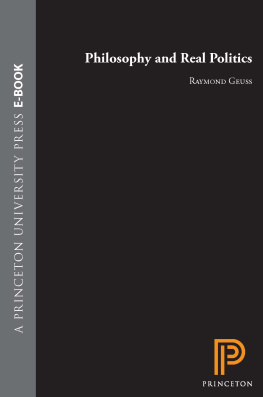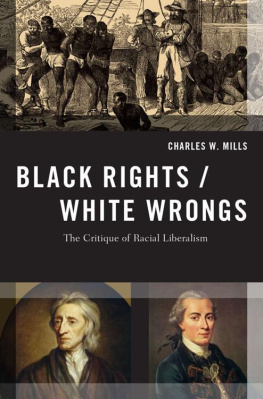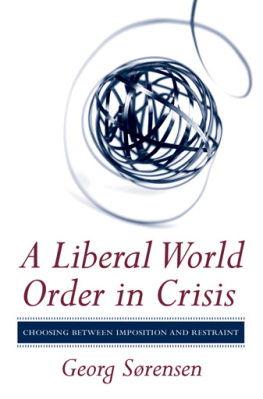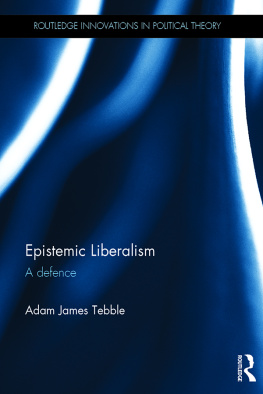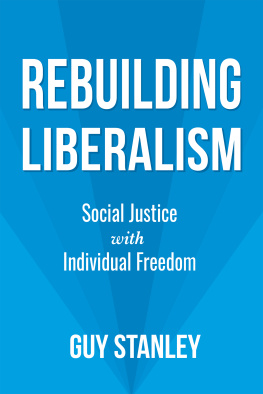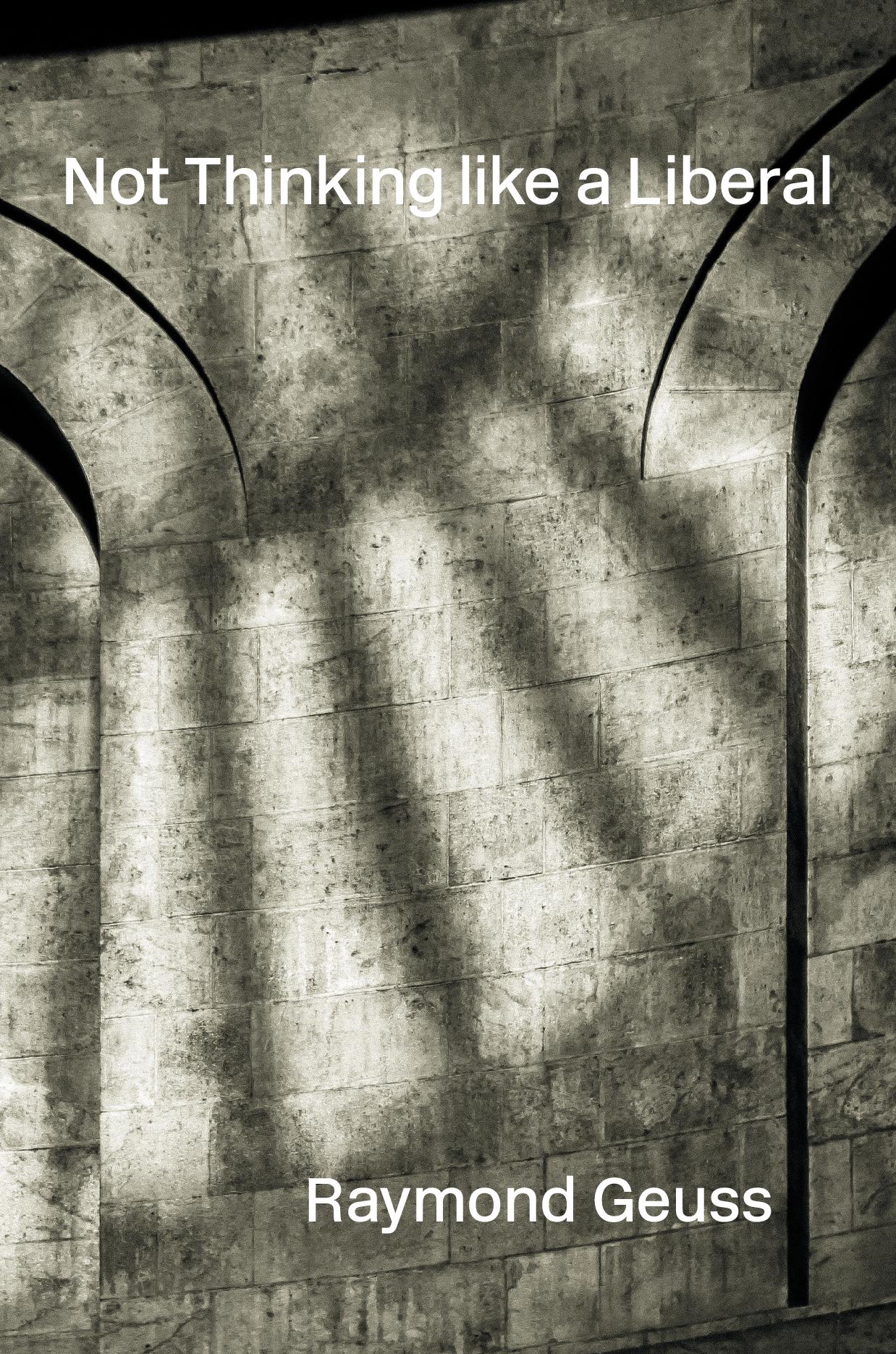
thinking like aliberal
Raymond Geuss
THE BELKNAP PRESSofHARVARD UNIVERSITY PRESS
Cambridge, Massachusetts | London, England2022
Copyright 2022 by the President and Fellows of Harvard College
All rights reserved
Jacket Design: Tim Jones
Jacket Photograph: Beautiful Light (detail), 2016 Joy Lions / Bridgeman Images
9780674270343 (cloth)
9780674276536 (EPUB)
9780674276543 (PDF)
The Library of Congress has cataloged the printed edition as follows:
Names: Geuss, Raymond, author.
Title: Not thinking like a liberal / Raymond Geuss.
Description: Cambridge, Massachusetts : The Belknap Press of Harvard University Press, 2022. | Includes bibliographical references and index.
Identifiers: LCCN 2021034389
Subjects: LCSH: Wolff, Robert Paul. | Morgenbesser, Sidney, 19212004. | Cumming, Robert Denoon, 19162004. | Liberalism. | Authoritarianism. | Political sciencePhilosophy.
Classification: LCC JC574 .G835 2022 | DDC 320.51092dc23
LC record available at https://lccn.loc.gov/2021034389
Aber schon der nchste Tag brachte eine arge Enttuschung. Thatte sich nmlich gleich am Morgen die Reclamausgabe jenes Bandes gekauft, den er bei seinem Professor gesehen hatte und bentzte die erste Pause um mit dem Lesen zu beginnen. Aber vor lauter Klammern und Funoten verstand er kein Wort und wenn er gewissenhaft mit den Augen den Stzen folgte, war ihm als drehe eine alte kncherne Hand ihm das Gehirn in Schraubenwindungen aus dem Kopfe.
The next day brought a terrible disappointment. On the very next morning Trle had bought the Reclam edition of the volume he had seen in the professors room and he used the first break in lessons to start reading. But there were so many parentheses and footnotes that he did not understand a word, and if he tried conscientiously to follow the sentences with his eyes, he had the feeling that an aged, bony hand was slowly extracting his brain from his skull, winching it out as if winding it around a screw.
Robert Musil,Die Verwirrungen des Zglings Trle
contents
Sous quelque angle quon le prenne, le prsent est sans issue. Ce nest pas la moindre de ses vertus.
No matter how one looks at it, the present has no future. That is by no means the least of its virtues.
Linsurrection qui vient(2007)
THE ANGLO-SAXON political, social, and economic model, the combination of a capitalist economic system with a liberal form of parliamentary democracy, seemed to work well for Great Britain and its English-speaking former colonies from the end of the eighteenth until the end of the twentieth centuryand especially well for the elites of those countries. In the second half of the twentieth century it even seemed to be establishing itself as the major benchmark for all modern societies. However, it has now been visibly unraveling for the past decade or so. The increase in the speed of this decline in the last five years, during the period of the ascendancy of Donald Trump in the United States and the campaign in the United Kingdom to leave the European Union, has been staggering.
There was always a certain tension in the way the Anglo-Saxon model was perceived in Britain and the United States. On the one hand, it was presented as a universal paradigm to which all people in all societies aspired, and the adoption of which would be in their own manifest self-interest. A rule-governed international system of parliamentary capitalist societies was the solution to the riddle of history which knows itself to be that solution, to use a phrase that Marx uses for a rather different political project (communism). On the other hand, it was very clearly understood (although perhaps never clearly stated) that if the whole world adopted capitalist liberal democracy, the result would inevitably be that weBritain and the United States as political entities, and the members of the dominant socioeconomic groups within each of these two societieswould remain reliably on top. One can see the tremendous ideological power of a construct that combined universalist pretensions with hard-headed self-interest, especially when it seemed to be confirmed by tangible economic and military success. It is difficult, I think, for anyone who grew up in one of these two societies to appreciate how odd it was to assume that these two aspectsthe universalist and the exceptionalistwould reliably continue to be correlated forever. Even those who were clearly socially, economically, or politically downtrodden and who might have been expected to have no special motive to accept the ideology did not necessarily find it easy to articulate their dissatisfaction because they lacked appropriate concepts and an appropriate framework. Members of marginal groups with their own theoretical traditions, even if these were deeply premodern, might have had a better chance of seeing the conflict between these two aspects clearly. As the economic and political situation became more troubled for the United States and for Britain, the tension between these two conceptions became harder to ignore and manage. In his own crude way, Donald Trump saw this and drew a coherent, if repellent, conclusion.
The economic crisis of 2008 was directly caused by the deregulation of the banking system, that is, by the application of what certainly look very much like standard liberal principles to the realm of finance. For a while, however, people seemed unwilling to recognize the significance of this fact, and, when they did, their reaction was surprisingly muted. The stress created by the economic collapse, however, had a gradual ripple effect which took a while to propagate. Only eventually, almost a decade later, did it cause the political systems in the United States and Britain to seize up. Whatever the exact etiology, Trump and Brexit have significantly dented the international appeal of a form of society that justifies itself by citation of John Locke, Adam Smith, the Federalist Papers, and John Stuart Mill. Liberalism is such an important part of the ideological framework of the Anglo-Saxon countries that the real economic and political decline of the United States and the United Kingdom cannot be expected to be without effect on the fate of liberalism.
I wrote this text in January 2021 while under lockdown during the coronavirus pandemic, just after the United Kingdom left the European Union. Although I do not mourn the passing of liberalism, these reflections also stand in this other, slightly different, political context. In a way the whole text is an indirect lamentation of the loss which the departure of the UK from the EU entails. My unbelievably privileged position as a retired professor with various entitlements (for instance, pensions) makes me relatively immune to the catastrophic economic effects of Brexit. The loss of much of what remained of British political power and influence in the world is something which I think might not actually be so bad at all, but the massive cultural loss that is a concomitant of our severing of ties with the European Union is one I think I shall probably never get over.
Thinking about Brexit and what the future holds for us automatically summons up for me memories of the Philadelphia I knew when growing up there in the late 1950s just before I left to go to boarding school, a place trying desperately to live up to an image of itself derived from a distant past, and fully aware that it was failing in that. Philadelphia had been a significant city in the 1790s, but by 1955 everything important was taking place elsewhere, in New York, Washington, DC, or Chicago. What is more, people in Philadelphia, in some vague and inarticulated way, knew that. My boarding school too lived in a highly stylized past, which I shall describe in this book. Brexit, too, is (partly) about a dream of returning to a fantasy past, in which the population of the UK was racially and culturally exceptionally homogeneous, and the society was powerful enough, and isolated enough on its islands, to be able to make decisions without much reference at all to the opinions, interests, and needs of its immediate neighbors or indeed of the rest of the world. The primary topic of this book is liberalism; a secondary one is the logic of living in a bubble of nostalgia.
Next page


